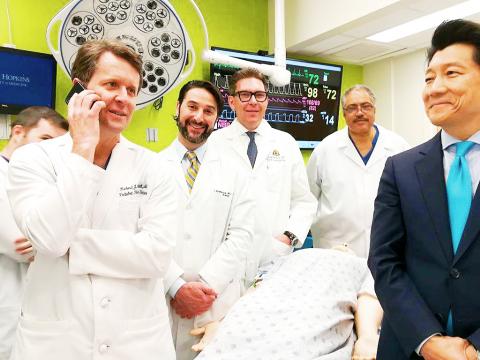Doctors at Johns Hopkins University School of Medicine on Monday said that they had performed the world’s first total penis and scrotum transplant on a US military serviceman who was wounded in Afghanistan.
The 14-hour operation was performed on March 26 by a team of nine plastic surgeons and two urologic surgeons led by Taiwanese-American W.P. Andrew Lee (李為平), a professor of plastic and reconstructive surgery and chairman of the school’s plastic and reconstructive surgery department.
“We are optimistic that he will regain near-normal urinary and sexual functions following a full recovery,” Lee told reporters.

Photo: Johns Hopkins School of Medicine / AFP
The patient was severely injured by a blast from an improvised explosive device in Afghanistan several years ago, Lee said.
The entire penis, scrotum without testicles and partial abdominal wall came from a deceased donor.
“It’s a real mind-boggling injury to suffer; it is not an easy one to accept,” the recipient said in a statement. “When I first woke up, I felt finally more normal.”
The man lost his testicles in the explosion and did not get them restored as part of his transplant.
“The testicles were not transplanted, because we had made a decision early in the program to not transplant germline tissue, that is to say not transplant tissue that generates sperm, because this would raise a number of ethical questions,” plastic surgeon Damon Cooney said.
Doctors said they are hopeful the man will be able to urinate with his penis in the coming weeks, and that he will eventually regain enough sensation to achieve an erection.
The extent of his sexual function will not be known for about six months, doctors said.
Lee was born in what was then-Kaohsiung County’s Gangshan Township (岡山) to a father serving in the Republic of China Air Force. He immigrated to the US when he was 15 to join an older brother and sister who had immigrated earlier.
He earned an honors degree in physics from Harvard and his medical degree from Johns Hopkins, where he also completed his general surgery residency and a microvascular research fellowship before completing his plastic surgery fellowship at Massachusetts General.
Initially specializing in hand surgery, he has been working on human-to-human limb transplantation since 1986. When he was chief of plastic surgery at the University of Pittsburgh Medical Center, he led a team that performed the first bilateral arm transplant in the US on an injured soldier.
Additional reporting by staff writer and CNA

CHAOS: Iranians took to the streets playing celebratory music after reports of Khamenei’s death on Saturday, while mourners also gathered in Tehran yesterday Iranian Supreme Leader Ayatollah Ali Khamenei was killed in a major attack on Iran launched by Israel and the US, throwing the future of the Islamic republic into doubt and raising the risk of regional instability. Iranian state television and the state-run IRNA news agency announced the 86-year-old’s death early yesterday. US President Donald Trump said it gave Iranians their “greatest chance” to “take back” their country. The announcements came after a joint US and Israeli aerial bombardment that targeted Iranian military and governmental sites. Trump said the “heavy and pinpoint bombing” would continue through the week or as long

TRUST: The KMT said it respected the US’ timing and considerations, and hoped it would continue to honor its commitments to helping Taiwan bolster its defenses and deterrence US President Donald Trump is delaying a multibillion-dollar arms sale to Taiwan to ensure his visit to Beijing is successful, a New York Times report said. The weapons sales package has stalled in the US Department of State, the report said, citing US officials it did not identify. The White House has told agencies not to push forward ahead of Trump’s meeting with Chinese President Xi Jinping (習近平), it said. The two last month held a phone call to discuss trade and geopolitical flashpoints ahead of the summit. Xi raised the Taiwan issue and urged the US to handle arms sales to

BIG SPENDERS: Foreign investors bought the most Taiwan equities since 2005, signaling confidence that an AI boom would continue to benefit chipmakers Taiwan Semiconductor Manufacturing Co’s (TSMC, 台積電) market capitalization swelled to US$2 trillion for the first time following a 4.25 percent rally in its American depositary receipts (ADR) overnight, putting the world’s biggest contract chipmaker sixth on the list of the world’s biggest companies by market capitalization, just behind Amazon.com Inc. The site CompaniesMarketcap.com ranked TSMC ahead of Saudi Aramco and Meta Platforms Inc. The Taiwanese company’s ADRs on Tuesday surged to US$385.75 on the New York Stock Exchange, as strong demand for artificial intelligence (AI) applications led to chip supply constraints and boost revenue growth to record-breaking levels. Each TSMC ADR represents

State-run CPC Corp, Taiwan (CPC, 台灣中油) yesterday said that it had confirmed on Saturday night with its liquefied natural gas (LNG) and crude oil suppliers that shipments are proceeding as scheduled and that domestic supplies remain unaffected. The CPC yesterday announced the gasoline and diesel prices will rise by NT$0.2 and NT$0.4 per liter, respectively, starting Monday, citing Middle East tensions and blizzards in the eastern United States. CPC also iterated it has been reducing the proportion of crude oil imports from the Middle East and diversifying its supply sources in the past few years in response to geopolitical risks, expanding